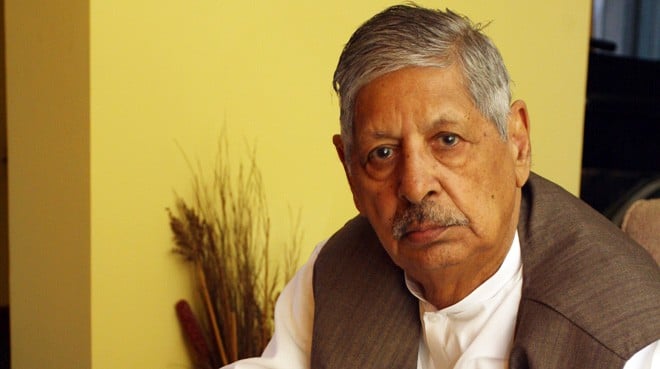From the Archives: Milestone in Publishing
Share
Milestone in publishing
I met Niaz sahib for the first time in the summer of 1989. I had recently moved back to Lahore from Karachi and was invited to some sort of a function at the showroom-cum-office of Sang-e-Meel Publications on Lower Mall. The image is very clear despite the intervening years: Niaz sahib wore a pair of light brown pants and a quietly checkered bush shirt.
He was a good listener, always very attentive. He never interrupted the other and when he spoke, it was always quietly. But he frequently broke into a rather boyish grin during his exchanges with his guests. Over the years, I knew that no one had ever heard his voice raised.
Among all the other guests, many of whom were known to him for years, most of whom had been published by him and were keen to have his attention, Niaz sahib found time to engage me in short snatches of conversation. He asked me how long I had been writing and what I intended to do in the future. At one point, he said, I should come back to see him the following day.
The following morning the first question he asked me was if I had a manuscript. I was taken aback. I had not written a book at that time; I only had a bunch of newspaper travel articles to my credit. When I said I hadn’t, he asked, almost shocked, if I had never kept a copy of the work I had handed over to the paper. That of course I had. Niaz sahib said I should bring the entire work around to the office.
He did not even bother to look through the rather thick file and said he would have it composed for the publication of my first anthology. I was utterly floored. I had heard how writers begged publishers and begged them for their first book and here was one who was just going ahead with the work of a greenhorn without even being asked. The result of this was Riders on the Wind.
In 1989, I had been writing for a mere three years. I was just barely known. I was not a successful writer that a publisher would have wanted to take my work. But Niaz sahib did. What was ever more surprising was the fact that he did not read English and therefore had no way of evaluating my work.
In a country where no publisher ever bothers to pay royalty, Niaz sahib was one of a kind.
To this day, I have not understood what Niaz sahib knew about my work without ever reading it. To me, he seems to be some sort of sage or clairvoyant, who just knew that this work would do just as well as a work in the English language could in Pakistan.
By the mid-1990s, when I was working on my third book for him, he was always telling me to get on with the work and produce one book every year. This was a permanent exhortation and encouragement from him. I lagged, however. But if I ever came up with an idea, Niaz sahib never said no. "When you’re done, you just bring in the manuscript," is what he always said.
In a country where no publisher ever bothers to pay royalty, Niaz sahib was one of a kind. He would telephone a few days after the book hit the shelves and ask if I didn’t need money or what. In a country where the norm is to delay payment without any reason for as long as possible, Niaz sahib was a rarity indeed. That was his way with his writer’s dues. But that was not where his generosity ended. He knew of my indigence and was forever offering me advances so that work never stopped. The only time I ever accepted an advance from him was when I needed to change my camera.
This remarkable man was so completely trusting that I had to sign no paper for the loan. I was simply handed over a hundred thousand rupees quietly and without a witness. I now recognise that his trusting nature rested in his own unshakeable rectitude: it was simply not him to make off with another man’s money and he trusted others to follow the same order.
I do not now recall how long it took me to repay the loan, but one thing that I will never forget is that neither Niaz sahib nor Afzaal, his son (the elder Ejaz sadly passed away more than a decade ago), ever mentioned the sum. The largesse of Niaz sahib’s spirit and the essence of his character passed on to his children.
I had the habit of purchasing books on credit. For a short while in the beginning, Afzaal would make a note of what I purchased. But then I was told to remember what I was taking. Again, I was never asked how much I owed the firm or when I would be able to redeem the dues. Once this debt ran for a couple of years and to some Rs 45,000. If I ever said I was sorry not being able to clear my dues, I was always shrugged off.
And this man, always ready to share of the wealth he had earned from sheer hard toil, was completely self-made. Years ago, Niaz sahib told me of the time shortly after Partition when he, just into his twenties, was penniless. He worked for an Urdu Bazaar publisher whose books he peddled on a bicycle. From there, he slowly worked his way up in the publishing world until sometime in the 1960s he established Sang-e-Meel Publications. It takes character to recall a time of indigence when one heads an empire such as he did. Niaz sahib could not only recall the hard times, he could talk of them with friends.
In 2010, he told me he was having trouble with arthritis in his knees. The year after one day as we together climbed the stairs of his printer’s office, Niaz sahib held me by the arm for assistance. Not long afterwards, he stopped attending office. I saw him a few times in his home, the last being when my friend Akhter Mummunka and I had breakfast with him and Afzaal last summer. By this time, he was largely home-bound, except for short forays in the car.
On January 10, a few months shy of his 85th birthday, Niaz Ahmad woke in the morning and had a cup of tea. Then he lay down again and when, a couple of hours later, his family tried to rouse him for breakfast, he had quietly passed away into his long night. As, in his life, when he did everything himself, so too in his final moments, he left the family to their morning routine, preferring to do what he had to do quietly and without ado.
In his bed, he seemed peacefully asleep. The face of this man who worked life to the hilt and enjoyed its good things did not become the mask of death. It was the face of a man who breathed his last knowing well that he had shared what he had earned honestly and with hard toil and that he had wronged no man. It was the face of a man who had never permitted conceit, meanness or arrogance to sully his spirit. It was the face of satisfaction with which Niaz Ahmad had lived his long and productive life.
Original Link:
https://www.thenews.com.pk/tns/detail/554592-milestone-publishing

